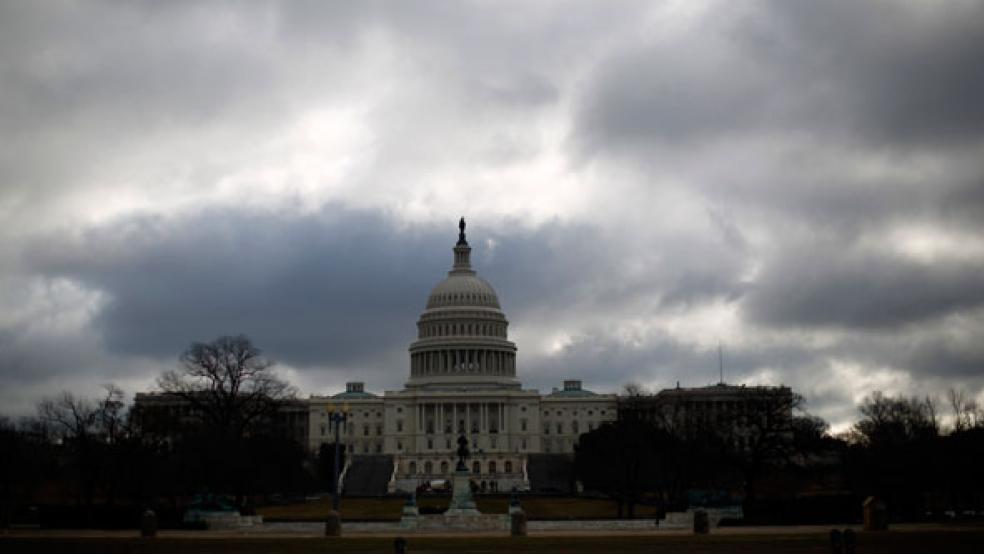Senate Budget Committee Chair Mike Enzi (R-WY) was hoping for a dispassionate, somewhat academic look at ways to repair the sorely dysfunctional federal budget process with an eye to addressing the long-term debt and entitlement reform. “When the process breaks down, so do the people’s faith in government and their elected officials,” he said on Wednesday morning.
With an historic, first-ever default on the government’s $18.1 trillion debt looming and lawmakers still miles apart on a new fiscal 2016 budget agreement to avoid another government shutdown in early December, partisan politics and a crisis atmosphere permeated the proceedings.
Related: Here’s Why the Odds of a U.S. Debt Default Just Increased
Sen. Bernie Sanders of Vermont, fresh from the Democratic presidential campaign trail, lectured Enzi on the folly of discussing budget reform without first taking into account the economic plight of the middle class and the dangers of trying to “balance the budget on the backs of the most vulnerable.”
“The chairman talks about people’s faith in government diminishing,” Sanders said, “but let me tell you something: If the United States government under the Republican leadership in the House and Senate does not pay its bills, you ain’t seen nothing yet in terms of people’s faith in government diminishing.”
“Our entire economy could be put at risk,” he added.
Deborah Weinstein, executive director of the Coalition on Human Needs, a social service advocacy network, denounced proposed spending caps and across the board cuts in the Republican-passed fiscal 2016 budget as a “needless backwards step further slowing the nation’s modest progress in reducing poverty.”
Related: What a Debt Ceiling Disaster Could Mean to You
And Sen. Angus King of Maine, an independent who caucuses with the Democrats, questioned whether any budget reform could be effective enough to overcome the gridlock and poisoned partisan atmosphere on Capitol Hill. “I’m all for reform but, come on,” King said during the hearing. “The problem is us, it’s not the process.”
“I’d say changing the process would be like rearranging the chairs on the deck of the Titanic, and that’s doing an injustice to the Titanic,” he said. “Congress needs to do its job.”
While there were a number of intriguing ideas for overhauling the budget and appropriations process, the current budget crisis and the House GOP leadership vacuum could indeed cause a repeat of the 16-day partial government shutdown in late 2013 or roil the international markets and the U.S. economy.
For now, the pressure is on outgoing House Speaker John Boehner (R-OH) and Senate Majority Leader Mitch McConnell (R-KY) to raise the debt ceiling and craft a deal that either placates right wing conservatives in the House and Senate or attracts enough Democrats to overcome conservative opposition. Boehner and McConnell are attempting to link adoption of new borrowing authority to stiff spending cuts in domestic and entitlement programs or even passage of a balanced budget amendment by the end of the year.
Related: House GOP Hatches Harebrained Debt Ceiling Fix
But President Obama and Democratic leaders are insisting on a “clean” debt ceiling authorization bill, with no strings attached. And Treasury Secretary Jack Lew once again warned that a default could come any time after November 3.
The White House and the Democrats have also rejected out of hand a measure pending in the House that would allow the Treasury to prioritize which obligations to meet once it started running out of cash. In that way, the Treasury would channel available funds to top priorities – such as paying the country’s major creditors and Social Security beneficiaries—while ignoring other obligations.
The so-called “Default Prevention Act” is similar to a GOP plan floated during the administration of Republican President George W. Bush, but was dismissed as unrealistic because the government automatically makes 80 million payments monthly while the flow of tax receipts fluctuates greatly.
Douglas Holtz-Eakin, a Republican economic adviser and a former director of the non-partisan Congressional Budget Office, dismissed the proposal as “political cover but not a solution of any type,” according to The New York Times.
Related: McConnell’s Last Stand – He Wants Medicare, Social Security Cuts to Raise Debt Limit
Holtz-Eakin and Michael Peterson, president and CEO of the Peter G. Peterson Foundation, a budget reform and research group, offered a series of proposals for dealing with the nation’s long-term debt. (Former Wall Street financier Pete Peterson, who founded the Peter G. Peterson Foundation, is also owner of The Fiscal Times).
“By any definition, the fiscal path we are on is unsustainable and dangerous,” Michael Peterson said, while noting that the budget deficit has plummeted from a high of $1.4 trillion during the Great Recession to $440 billion today. “We need a more effective, forward-looking budget process, because there are severe consequences of our current fiscal path.”
Drawing on proposals from five leading think tanks across an ideological spectrum, Peterson urged Congress to consider a number of ideas, including “looking further into the future” by producing long-term budget forecasts of 25 years instead of the current ten-year budget window. Without that, he said, “there’s no meaningful discussion of long-term trends, there’s no visible information about long-term effects, and there’s no credit given for long-term improvement.”
Holtz-Eakin complained that Congress continues to pursue a piecemeal approach to overall budgeting without facing up to the need for fundamental reforms of entitlement programs.
Related: The Debt Ceiling – What Is It and Why Should We Care?
His main recommendation is for the federal government to develop binding “fiscal rules” that would take the form of an overall cap on all federal spending – discretionary and entitlements – possibly as a percentage of GDP.
“Committing to a fiscal rule would force the current, disjointed appropriations, mandatory spending and tax decisions to fit coherently within the adopted fiscal rule,” he said. “Accordingly, it would force lawmakers to make tough tradeoffs, especially across categories of spending.”





